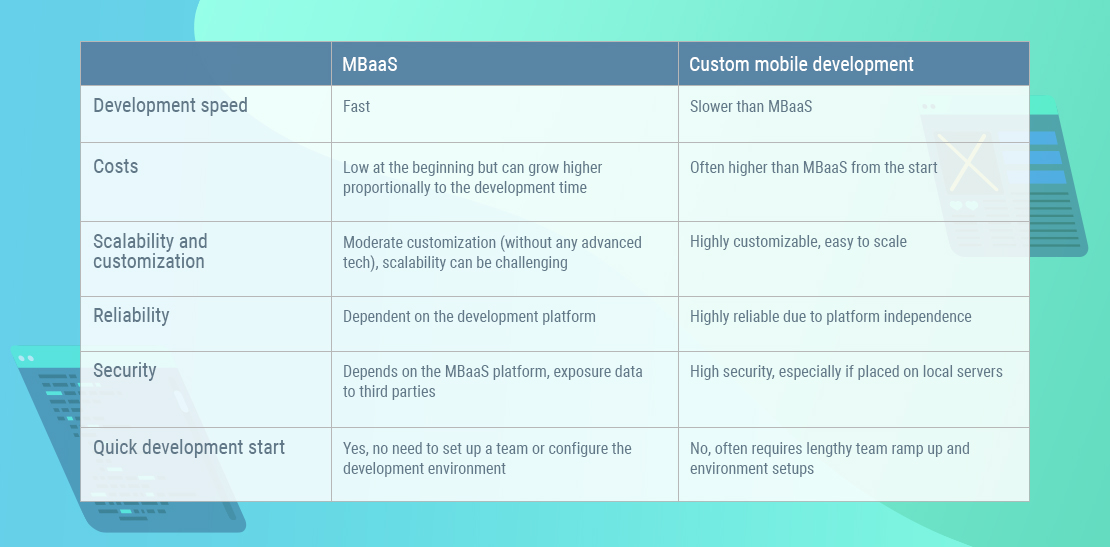What Is MBaaS and Why You Should Use It When Building Apps?
Today, more and more companies move their applications’ back-ends to cloud platforms. This approach helps to decrease software maintenance costs and allows software developers to significantly speed up application development. In this respect, the development of mobile applications isn’t any exception.
There is a wide range of cloud-based platforms that provide mobile developers with special tools, APIs, and services that allow building robust and effective Android and iOS apps with less budget and much faster.

In this article, we’ll look into what a Mobile back-end as a Service (MBaaS) is, why many businesses switch to MBaaS, and how your mobile development project could benefit from shifting to MBaaS.
What Is Mobile Back-End as a Service?
Mobile back-end as a service (MBaaS) is a service for building mobile apps’ back-ends on cloud computing platforms. This online solution provides mobile developers with various tools like software development kits (SDKs), applications programming interfaces (APIs), and ready-to-use functionalities to create quick and effective mobile back-ends.
MBaaS platforms include all the necessary server-side infrastructure and features such as API management, data, and database management, geolocation, social media integration, push notifications, authentication, user management, and others that allow building stable mobile back-ends without much development effort. As a result, mobile engineers can focus more on creating their mobile apps’ frontends, avoiding spending much time on back-end code creation.
Are MBaaS and BaaS the Same Thing?
Mobile Back-end as a Service (MBaaS) concept is often used interchangeably with Back-end as a Service (BaaS). Although there is a slight difference between the two notions, they have pretty much the same idea. While MBaaS platforms are more related to mobile back-end development, BaaS represent a more versatile solution and aim at mobile as well as at web-based development. Therefore, the services offered at these types of platforms are very similar, just MBaaS is more mobile-specific.
BaaS vs. Creating Your Own Back-End
The choice between a BaaS platform and hiring a mobile development team for building your own back-end depends on various factors. For example, the technologies you want to implement in your digital solution, the project development deadline, project budget, and others.
For you to understand which type of development would suit your mobile project better, here is a detailed comparison of the two approaches.
Development Speed
While custom software development requires building a mobile back-end from scratch, MBaaS offers software developers a back-end construction set. It contains back-end blocks that programmers can compile in a properly functioning system really fast.  MBaaS solutions are especially valuable for creating MVP products when time-to-market is particularly important.
MBaaS solutions are especially valuable for creating MVP products when time-to-market is particularly important.
Quick Development Start
With MBaaS solutions, mobile developers don’t need to spend much time on setting up and configuring their servers, databases, frameworks, and much more. They can get to app creation at once with a well-established development environment and all the development tools at hand.
Development Price
Development price has a direct relation to the development timeline. The more time is spent on the app’s development the higher is the price. Mobile developers can build their apps much faster with MBaaS platforms than with a custom software development approach. Moreover, custom development requires hiring a whole team of development experts, often with narrow specialization to embed advanced technologies, unique solutions, or build the app’s functionality from the ground up.
However, MBaaS solutions often provide fee-based services or may offer free development with limited features and, therefore, result in higher rates than custom development in the long run. For this reason, MBaaS better suits medium or short-term development projects.
Security
MBaaS platforms alleviate GDPR implementation. GDPR is the EU standard that demands businesses to establish strong protection of personal user data online. To ensure an app’s compliance with all the GDPR requirements, software engineers who do custom development can spend days on the implementation of HTTPS encryption, creating logging and accounting features, and so on.
MBaaS platforms make GDPR utilization less complex as it provides various pre-built features for numerous security cases. Using MBaaS platforms for developing apps with GDPR standards is a viable solution for small and medium-sized projects.
On the other hand, when using MBaaS solutions for building their apps, mobile developers expose their data to third-party platforms. This way, any confidential data is vulnerable to potential hacker attacks or leaking. In the case of custom software development, the possibility of data leaking is less likely to happen, especially when the data is stored on local servers. Therefore, if you choose an MBaaS provider for building your apps, consider only well-known, time-tested, and secure solutions like Backendless, Firebase, AWS Amplify, Apple CloudKit, and others.
Scalability and Customization
With MBaaS solutions, mobile developers can build customized mobile apps to some extent. It means that they can have their own set of functions necessary for a particular business like push notifications, connection to social media, though they won’t include some advanced technologies like IoT-specific solutions or AR/VR features. Moreover, if your business grows quickly and your mobile app requires scaling, it may be very difficult to achieve fast scalability with MBaaS platforms.
Reliability
When choosing their MBaaS platforms, mobile developers need to make sure that they will be able to extract their mobile app from it in case it breaks down or stops providing the service. Custom software development is platform-independent and you can change your app functionality with the help of your software development provider at any time.
Here is a quick summary of MBaaS vs Custom mobile development.

When to Use MBaas?
As a standardized and quick development solution, MBaaS fits well small and medium-sized projects with a short development period that doesn’t require the implementation of any unique functionalities or cutting-edge technologies.
The most common cases when MBaaS is used for mobile development are:
- development of a Minimum Viable Product (MVP) – a basic version of a product for quick launch in the market;
- creation of mission-critical enterprise apps–these apps should perform with minimum downtime for successful business functioning. For example, banking institutions opt for a cloud-first strategy and digital banking platforms to ensure stable work of their banking systems;
- development of simple apps with classic architecture–apps built with a definite set of standardized features for back-end development, yet adapted to the needs of a particular business.
Conclusion
Mobile back-end as a service is quickly gaining popularity among small and medium-sized businesses due to the great number of benefits it provides. Businesses don’t require hiring a back-end development team and use MBaaS for quick and effective mobile development. Meanwhile, many large businesses also utilize MBaaS for building their MVPs if time-to-market is crucial.
There is a wide range of MBaaS platforms that can be found online. Though, businesses need to carefully explore each one and find out if they’re secure and provide the possibility to extract the source code of the developed app or shift it to other platforms in case it quits working.












